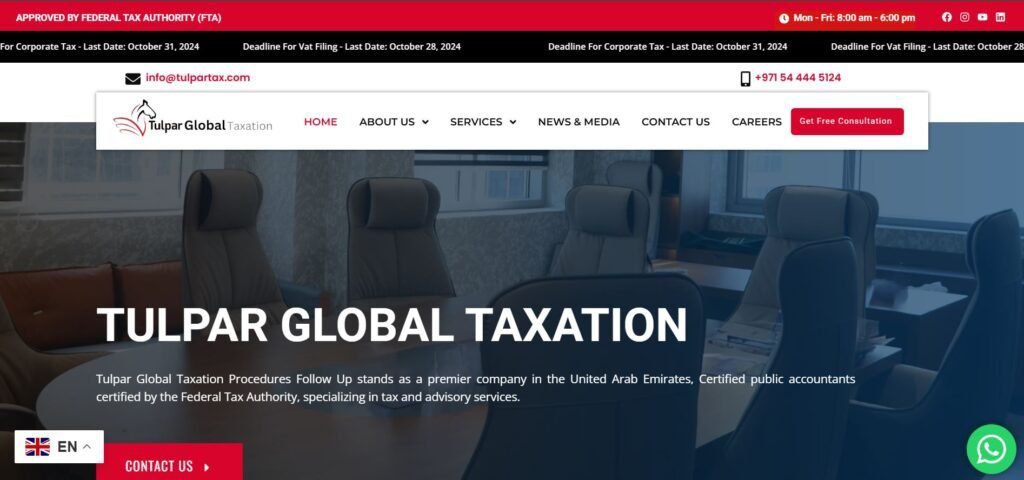
Unincorporated Partnerships Subject to Corporate Tax UAE
Table of Contents
Related Articles


The Impact of CARF on UAE Crypto Traders | Ready to Report FTA

Feasibility Study Report Preparation in UAE

Let's Talk
Sign Up For Free Consultation
Un-incorporated Partnerships Subject to Corporate Tax UAE
Un-incorporated partnerships are a widely used business structure in the UAE, valued for their simplicity and collaborative nature. However, their unique characteristics distinguish them from incorporated entities under the UAE’s Corporate Tax Law. Unlike incorporated businesses, unincorporated partnerships do not have a separate legal identity. This means that tax responsibilities fall directly on individual partners rather than the partnership itself, making it a transparent entity in legal terms.

This transparency requires each partner to report their share of the partnership’s profits, liabilities, and taxes according to their agreed-upon share in the partnership. Such a structure offers flexibility but also introduces complexities in tax compliance, especially with the implementation of the UAE Corporate Tax Law in June 2023. Partners must understand their roles and obligations to ensure accurate reporting and adherence to legal requirements.
To navigate these complexities, businesses can benefit from professional assistance. Tulpar Global Taxation specializes in helping unincorporated partnerships meet compliance standards, from drafting agreements that align with tax regulations to assisting with accurate profit allocation and filing tax returns. With expertise in the UAE’s tax framework, Tulpar ensures that partnerships operate smoothly and efficiently while minimizing the risk of non-compliance.
What Are Unincorporated Partnerships?

Un-incorporated partnerships are business structures formed by two or more individuals or entities through a contractual agreement to operate collectively. Unlike incorporated entities, these partnerships lack a separate legal identity, meaning the assets, liabilities, and income are directly attributed to the partners. Each partner is individually responsible for the profits, losses, and any tax obligations arising from the business operations, as stipulated under the UAE Corporate Tax Law. This model promotes flexibility and shared decision-making but places significant compliance responsibilities on the individual partners.
In the UAE, un-incorporated partnerships are considered transparent entities for taxation. Instead of taxing the partnership as a whole, the profits or losses are distributed among the partners according to their agreed shares, and each partner reports their portion in their tax filings. This requires clear agreements and diligent record-keeping to ensure fair distribution and compliance with regulations. The UAE’s Federal Tax Authority (FTA) oversees such partnerships, emphasizing accurate documentation and compliance. Businesses can seek expert guidance from firms like Tulpar Global Taxation to manage these requirements efficiently.
Defining Unincorporated Partnerships
An unincorporated partnership is a business arrangement between two or more parties bound by a contractual agreement to conduct business together. These partnerships are not separate legal entities, meaning assets, liabilities, and profits belong to the partners themselves. This structure is particularly favored for its simplicity and direct control, but it also places significant tax responsibilities on individual partners.
Key Features of Unincorporated Partnerships
- No Legal Personality:
A partnership does not have a separate legal personality like a corporation. This means the partnership itself cannot own assets or incur liabilities independently. Instead, all the assets, debts, and obligations are directly attributed to the individual partners. This arrangement creates a direct connection between the partners and the partnership’s financial responsibilities, which are shared and managed collectively by the partners themselves.
- Transparency in Operations:
In a partnership, each partner is required to report their share of the partnership’s income, expenses, and other financial matters on their personal tax returns. This ensures that each partner is individually responsible for paying taxes on their share of the partnership’s earnings. The partnership does not pay taxes as an entity, which makes it essential for each partner to accurately report their portion of the financial activity for tax purposes.
- Customizable Agreements:
One of the key features of a partnership is the flexibility it offers through customizable agreements. Partners can decide how to divide profits, losses, and liabilities in a way that best suits their business needs and goals. These terms, which are outlined in a partnership agreement, allow partners to tailor the structure of their relationship, making it adaptable to their unique financial and operational preferences.
How Does UAE Corporate Tax Apply?

The UAE introduced a corporate tax system effective from June 2023, applying a 9% tax rate on businesses with profits exceeding AED 375,000. This tax is designed to align with global tax standards while maintaining the UAE’s competitive business environment. The tax applies to most business activities, including those conducted by companies, partnerships, and other legal entities operating within the country. However, certain business sectors, such as oil, gas, and natural resource extraction, may be subject to different tax rates, depending on the specific regulations governing those industries.
Corporate tax in the UAE is levied on the net profits of a company, which means allowable business expenses, such as salaries, rents, and operational costs, can be deducted from the total revenue to reduce taxable income. Free zone businesses may also benefit from specific exemptions or reduced tax rates, provided they meet the criteria set for free zone operations. It is essential for businesses to maintain proper accounting and financial records to comply with the new tax system and ensure accurate reporting of taxable income, as well as to benefit from any exemptions or incentives available.
The Transparency Model in Taxation
Under UAE Corporate Tax Law, unincorporated partnerships are categorized as transparent entities, meaning the partnership itself is not taxed as a separate legal entity. Instead of the partnership being subject to corporate tax, the income generated by the partnership is allocated to the individual partners, who are then taxed based on their share of the partnership’s earnings. This approach ensures that the partnership itself does not bear the tax burden. Each partner is responsible for reporting their portion of the income on their personal tax returns, thereby avoiding double taxation that could arise from taxing the same income at both the partnership and individual levels.
This system of transparency also simplifies tax compliance, as partners are only taxed on their individual earnings rather than the overall profits of the partnership. Additionally, the lack of double taxation encourages investment and business growth within the UAE, aligning with the country’s broader goal of fostering a business-friendly environment. It also provides flexibility for the partners to manage their income tax obligations directly, based on their share in the partnership’s activities and profits.
Taxable Income for Partners
Each partner is responsible for declaring their share of income or profit derived from the partnership. The Federal Tax Authority (FTA) requires that:
- Income be allocated as per the partnership agreement.
- If no agreement exists or if it’s unclear, the FTA determines the appropriate allocation.
- Direct costs incurred by partners, such as capital contributions, are deductible, while earned interest is taxable.
For example, if a partnership generates AED 1 million in profits and Partner A owns 60% while Partner B owns 40%, their respective taxable incomes will be AED 600,000 and AED 400,000, adjusted for allowable deductions.
Opting for Taxable Entity Status

The Importance of Transparency in Tax Compliance
Opting for taxable entity status under the UAE Corporate Tax Law allows businesses to be treated as separate legal entities for tax purposes. This means the entity itself is subject to corporate tax on its profits, rather than passing the tax obligation to individual partners or shareholders. By electing taxable entity status, businesses can benefit from certain advantages, such as clearer tax compliance requirements, the ability to carry forward losses to offset future profits, and the possibility of accessing more favorable tax treatments or exemptions in specific sectors. This option provides businesses with a structured approach to taxation and can simplify financial planning and reporting.
However, while opting for taxable entity status offers certain benefits, it also comes with increased administrative responsibilities. Businesses must ensure they meet all corporate tax obligations, including the proper filing of tax returns and maintaining detailed financial records. They are also subject to tax on their overall profits, which may not be advantageous for all business types, especially smaller businesses or those operating with low margins. Therefore, businesses need to carefully assess the pros and cons of electing taxable entity status based on their unique financial situation and long-term goals before making this decision.
When Can Partnerships Elect for Corporate Taxation?
Although un-incorporated partnerships are not automatically subject to corporate taxation in the UAE, they have the option to apply to the Federal Tax Authority (FTA) to be treated as taxable entities. This election allows the partnership to be taxed as a separate entity, meaning it will be responsible for paying taxes on its profits rather than the partners being taxed individually. Partnerships might consider electing for corporate taxation when it provides administrative convenience, such as centralized tax reporting or the ability to carry forward losses to offset future profits. Additionally, this status can be beneficial if the business structure requires clearer delineation between the entity’s finances and the partners’ personal taxes.
However, electing for taxable entity status comes with additional compliance and reporting responsibilities. The partnership must file regular tax returns and ensure that financial records are kept in accordance with UAE tax regulations. This increases the administrative burden, as partners will no longer report income individually but must ensure the partnership’s compliance as a whole. Before opting for corporate taxation, partnerships should weigh the benefits of simplified tax administration against the added complexity and costs associated with maintaining compliance under the new tax framework.
Responsibilities Upon Approval
If approved by the FTA, the partnership becomes a taxable person. Key implications include:
- The partnership must file corporate tax returns.
- Partners remain jointly and severally liable for any tax obligations.
- The election applies from the start of the tax period during which the application is made.

Transparency in tax compliance is crucial for maintaining a fair and efficient taxation system. In the UAE, businesses are required to maintain clear and accurate financial records to ensure they are fully compliant with corporate tax laws. This includes reporting income, expenses, and profits in a transparent manner, allowing tax authorities to verify that businesses are meeting their tax obligations. Transparency not only helps to avoid legal issues or penalties but also fosters trust with regulatory authorities, investors, and stakeholders by demonstrating that the business operates ethically and responsibly.
Moreover, transparency in tax compliance allows businesses to better manage their tax liabilities and plan for future financial strategies. By keeping clear records and making all relevant financial information accessible, businesses can take advantage of tax incentives, exemptions, and credits available to them. It also ensures that any changes in tax laws or financial circumstances are properly addressed, reducing the risk of errors or omissions in tax filings. For partnerships and corporations alike, operating with transparency is not just about meeting regulatory requirements but also about building a reputation for integrity in the marketplace.
Clarity in Agreements and Documentation
Transparency is critical to avoid disputes and ensure compliance. A well-defined partnership agreement should specify:
- Profit-sharing ratios.
- Methods for allocating expenses and liabilities.
- Roles and responsibilities of each partner in managing tax compliance.
FTA Monitoring and Audits
Un-incorporated partnerships in the UAE are required to maintain detailed and accurate records to comply with tax regulations. This includes keeping comprehensive financial statements that track all income, expenses, and profits. Additionally, partnerships must retain documentation related to tax filings, including any supporting information that shows how income is allocated among the partners. Proper record-keeping ensures that the partnership can demonstrate its compliance with corporate tax laws and provides a clear overview of the partnership’s financial health. These records must be organized and readily accessible for inspection by the authorities when needed.
The UAE’s Federal Tax Authority (FTA) has the right to audit the records of un-incorporated partnerships to ensure they are following the legal requirements and properly reporting their income and expenses. If discrepancies or errors are found during an audit, the partnership may face penalties or additional scrutiny. Therefore, it is essential for partnerships to establish robust internal controls and accounting practices to avoid issues during an audit. Accurate record-keeping not only ensures legal compliance but also helps partnerships avoid potential legal complications and maintain a smooth relationship with tax authorities.
Common Challenges for Unincorporated Partnerships

Unincorporated partnerships in the UAE face several challenges, particularly due to the lack of a distinct legal personality. Since the partnership does not exist as a separate entity, it can create complexities in terms of liability and financial responsibility. Partners are personally liable for the debts and obligations of the partnership, which can put their personal assets at risk if the business encounters financial difficulties. Furthermore, the absence of limited liability can deter some potential investors or partners from getting involved, as they may not want to assume the personal risk that comes with this structure.
In addition to liability issues, unincorporated partnerships often struggle with tax compliance and reporting. While they benefit from the transparency model, where the income is taxed at the partner level, this requires careful tracking of each partner’s share of the partnership’s profits and losses. Any discrepancies in income allocation or tax filings can lead to penalties or disputes with the Federal Tax Authority (FTA). Additionally, the lack of a formal entity structure can make it challenging to secure financing or establish long-term business credibility, as lenders and investors may prefer the legal protections offered by incorporated businesses.
Navigating Compliance Complexities
Many partnerships struggle with determining taxable income, especially when dealing with foreign income or operations across multiple jurisdictions. The complexity of calculating what qualifies as taxable in the UAE versus other regions can create confusion, particularly with varying tax laws, transfer pricing issues, and tax treaties. This challenge is compounded by the need to maintain accurate documentation, a task often overlooked. Proper record-keeping, including detailed proof of income, expenses, and profit allocations, is essential to ensure compliance and avoid penalties. Without these records, partnerships risk facing audits, disputes with tax authorities, and potential legal complications, making thorough documentation a crucial part of the business operation.
Avoiding Penalties
Failure to comply with the UAE Corporate Tax Law can result in severe penalties, including fines for late filings, inaccurate declarations, or the absence of proper documentation. These penalties can significantly impact a partnership’s finances and reputation, making it crucial for businesses to stay on top of tax deadlines and regulations. Ensuring accurate and timely tax filings, maintaining thorough documentation, and adhering to all legal requirements can help avoid costly fines and audits. Proactive measures, such as regular internal audits, accounting oversight, and legal consultations, are critical for maintaining compliance and preventing issues before they arise.
Tulpar Global Taxation: Simplifying Tax Compliance

Tulpar Global Taxation offers a comprehensive approach to simplifying tax compliance for businesses navigating complex tax systems. With a deep understanding of both local and international tax laws, Tulpar Global helps businesses stay compliant with the UAE Corporate Tax Law while optimizing their tax strategies. The company provides expert guidance on determining taxable income, handling cross-border taxation, and ensuring accurate documentation. Their tailored solutions help businesses avoid common pitfalls, such as late filings or inaccurate declarations, by offering proactive planning, timely reporting, and efficient management of tax-related obligations.
In addition to offering tax compliance services, Tulpar Global Taxation also specializes in helping businesses understand and implement tax-efficient structures that align with their financial goals. Whether it’s assisting with the transition to taxable entity status, providing insights into available tax incentives, or ensuring that businesses meet their reporting obligations, Tulpar Global’s team of experts ensures that companies can focus on growth without the stress of navigating the complexities of tax laws. By offering clear and actionable tax strategies, Tulpar Global helps businesses maintain compliance, reduce liabilities, and improve overall operational efficiency.
Expertise in Partnership Taxation
Tulpar Global Taxation specializes in assisting unincorporated partnerships in navigating their complex tax obligations with ease and precision. We understand that partnerships face unique challenges, particularly when it comes to filing individual partner returns, allocating income, and managing compliance with local tax laws. Our team is well-versed in the intricacies of UAE Corporate Tax Law and offers tailored solutions to meet the specific needs of each partnership. From helping partners file accurate and timely tax returns to providing guidance on how to apply for taxable entity status with the Federal Tax Authority (FTA), we ensure that our clients remain compliant while minimizing tax liabilities.
Whether the partnership operates locally or across multiple jurisdictions, Tulpar Global provides proactive support to address all tax-related matters, offering clear advice and strategic planning to help businesses stay ahead of regulatory requirements. Our approach not only simplifies the tax compliance process but also optimizes financial strategies, allowing businesses to focus on growth and success without the stress of managing complex tax issues.
Why Choose Tulpar Global Taxation?
- End-to-End Support: We handle everything from registration to compliance and audits.
- Customized Solutions: Our services are tailored to the partnership’s size, industry, and goals.
- Proactive Planning: By working with us, businesses can optimize tax efficiency while ensuring full compliance.
Taking Action for Tax Compliance

Taking action for tax compliance is crucial for any business, especially in the context of rapidly changing tax laws and regulations. For businesses operating in the UAE, staying compliant with the Corporate Tax Law is essential to avoid penalties, fines, or even legal issues. This requires a proactive approach, where businesses ensure timely filing of tax returns, accurate reporting of taxable income, and proper documentation of financial transactions. Maintaining up-to-date records, implementing internal controls, and regularly reviewing tax obligations are vital steps in ensuring compliance. Failure to act on these requirements can lead to unnecessary risks, including costly audits and reputational damage, which can be avoided with the right strategies in place.
Businesses must also take action to assess their tax structure and determine the most beneficial tax options available to them. Whether it involves applying for taxable entity status or reviewing eligibility for tax incentives, taking informed steps toward compliance can help reduce tax liabilities and improve overall financial efficiency. Engaging with tax professionals or utilizing specialized tax services can further streamline the process, ensuring that all obligations are met while maximizing opportunities for savings. In an increasingly complex tax environment, being proactive and taking timely action for tax compliance is not just a legal necessity but also a smart business strategy for long-term success.
Preparing for the Future
Unincorporated partnerships must take a proactive approach to tax planning to ensure compliance and minimize liabilities. This includes revisiting partnership agreements to ensure that income allocation and liability distribution are clearly defined and aligned with tax laws. Maintaining transparent and organized records is also essential, as it helps ensure accurate reporting of income and expenses, which is critical for tax filings. Additionally, partnerships should regularly consult tax experts to address any uncertainties, especially when dealing with complex tax regulations or cross-border operations. Seeking professional advice helps identify potential tax-saving opportunities and avoid costly mistakes. By staying proactive and well-informed, partnerships can effectively manage their tax obligations and avoid legal complications.
Partner with Tulpar Global Taxation Today
Navigating corporate tax regulations can be a complex and daunting task, especially for businesses like un-incorporated partnerships that face unique challenges. At Tulpar Global Taxation, we specialize in simplifying this process and providing tailored solutions that address the specific needs of your partnership. Whether you’re seeking guidance on tax planning, compliance with UAE Corporate Tax Law, or assistance with FTA applications for taxable entity status, our team of experts is here to provide professional advice and support every step of the way. With our proactive approach, we help ensure that your partnership stays on the right track, avoiding costly mistakes and legal complications, while optimizing tax strategies for growth.
This article highlights the key nuances of tax obligations for unincorporated partnerships under UAE law, offering valuable insights and actionable steps to help businesses stay compliant. Our expertise at Tulpar Global Taxation ensures that you have the right resources to tackle these challenges with confidence. By partnering with us, you gain access to professional support that helps simplify your tax management, giving you peace of mind and the freedom to focus on your partnership’s success. For expert guidance and a seamless path to compliance and growth, contact Tulpar Global Taxation today — your trusted partner in tax solutions.
